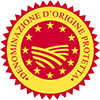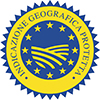D.O.P.

D.o.p. is a quality assurance label for Italian food products, especially Italian wine and cheese (Denominazione di origine protetta). The system is modelled on the French Appellation d’origine contrôlée (AOC) designations. The Italian government introduced the system in 1963 and overhauled in 1992 to comply with European Union law on protected geographical designations of origin, which came into effect that year.
There are three levels of labels: DO — Denominazione di Origine (designation of origin, seldom used), DOC — Denominazione di Origine Controllata (controlled designation of origin), and DOCG — Denominazione di Origine Controllata e Garantita (controlled and guaranteed designation of origin). All three require that a food product be produced within the specified region using defined methods and that it satisfy a defined quality standard.
The need for a DOCG identification arose when the DOC designation was, in the view of many Italian food industries, given too liberally to different products. A new, more restrictive identification was then created as similar as possible to the previous one so that buyers could still recognize it, but qualitatively different.
I.G.P.

Three European Union schemes of geographical indications and traditional specialties, known as protected designation of origin (PDO), protected geographical indication (PGI), and traditional specialities guaranteed (TSG), promote and protect names of quality agricultural products and foodstuffs.[1] They are based on the legal framework provided by the EU Regulation No 1151/2012 of the European Parliament and of the Council of 21 November 2012 on quality schemes for agricultural products and foodstuffs.[2] This regulation (enforced within the EU and being gradually expanded internationally via bilateral agreements between the EU and non-EU countries) ensures that only products genuinely originating in that region are allowed to be identified as such in commerce. The legislation first came into force in 1992. The purpose of the law is to protect the reputation of the regional foods, promote rural and agricultural activity, help producers obtain a premium price for their authentic products, and eliminate the unfair competition and misleading of consumers by non-genuine products,[3] which may be of inferior quality or of different flavour.

